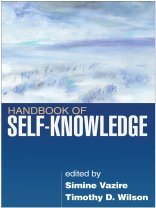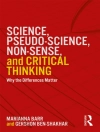This authoritative handbook reviews the state of the science of self-knowledge, a key emerging area in psychology. Leading investigators describe innovative theory and research that is shedding new light on how—and how accurately—people perceive their own traits, thoughts, feelings, behavior, and relationships. Coverage encompasses the behavioral, mental, biological, and social structures that underlie self-knowledge; approaches to studying self-beliefs in specific domains; and the motives and biases that influence accuracy. The volume explores the personal and societal benefits of self-knowledge and also considers possible ways to enhance it.
表中的内容
1. Introduction, Simine Vazire and Timothy D. Wilson I. The Origins and Nature of Self-Knowledge2. The Development of Self-Knowledge, Daniel Hart and M. Kyle Matsuba3. Self-Insight from a Dual-Process Perspective, Bertram Gawronski and Galen V. Bodenhausen4. Referential Processing and Competence as Determinants of Congruence between Implicit and Explicit Motives, Oliver C. Schultheiss and Alexandra Strasser5. Self-Knowledge: From Philosophy to Neuroscience to Psychology, Matthew D. Lieberman6. Blind Spots to the Self: Limits in Knowledge of Mental Contents and Personal Predispositions, Jason Chin, Michael Mrazek and Jonathan Schooler7. Other People as a Source of Self-Knowledge, Sanjay Srivastava8. Self-Knowledge: An Individual-Differences Perspective, Roberta A. Schriber and Richard W. Robins II. Domains of Self-Knowledge9. Knowing Our Personality, Mitja D. Back and Simine Vazire10. Knowing Our Attitudes and How to Change Them, Pablo Briñol and Richard E. Petty11. Self-Knowledge, Unconscious Thought, and Decision Making, Maarten W. Bos and Ap Dijksterhuis12. Knowing Our Emotions: How Do We Know What We Feel?, Gerald L. Clore and Michael D. Robinson13. On (Not) Knowing and Feeling What We Want and Like, Galit Hofree and Piotr Winkielman14. Partner Knowledge and Relationship Outcomes, Jeffry A. Simpson, Jennifer Fillo, and John Myers15. Meta-Accuracy: Do We Know How Others See Us?, Erika N. Carlson and David A. Kenny16. Knowing Our Pathology, Thomas F. Oltmanns and Abigail D. Powers III. Knowing Our Past and Future Selves17. Affective Forecasting: Knowing How We Will Feel in the Future, Kostadin Kushlev and Elizabeth W. Dunn18. Past Selves and Autobiographical Memory, Colleen M. Kelley and Larry L. Jacoby19. Self-Conceptualization, Self-Knowledge, and Regulatory Scope: A Construal-Level View, Cheryl J. Wakslak, Yaacov Trope, and Nira Liberman20. Sitting at the Nexus of Epistemological Traditions: Narrative Psychological Perspectives on Self-Knowledge, Jonathan M. Adler IV. Motives and Biases in Self-Knowledge21. Illusions of Self-Knowledge, Katherine E. Hansen and Emily Pronin22. Classic Self-Deception Revisited, Delroy L. Paulhus and Erin Buckels23. On Motivated Reasoning and Self-Belief, Erik G. Helzer and David Dunning24. From “Out There” to “In Here”: Implications of Self-Evaluation Motives for Self-Knowledge, Michael J. Strube25. Reducing Egoistic Biases in Self-Beliefs, Mark R. Leary and Kaitlin Toner
关于作者
Simine Vazire, Ph D, is Assistant Professor of Psychology at Washington University in St. Louis. Her research examines how well people know their own personalities and behavior, and how well people know the impressions they make on others. Dr. Vazire has received the SAGE Young Scholar Award from the Foundation for Personality and Social Psychology, the Early Career Award from the International Society for Self and Identity, and the Outstanding Faculty Mentor Award from Washington University in St. Louis. Timothy D. Wilson, Ph D, is Sherrell J. Aston Professor of Psychology at the University of Virginia. He has conducted research in the areas of self-knowledge, happiness, social cognition, and using social psychological principles to solve personal and social problems. Dr. Wilson is a recipient of the All-University Outstanding Teacher Award and the Distinguished Scientist Award from the University of Virginia and is an elected member of the American Academy of Arts and Sciences.












